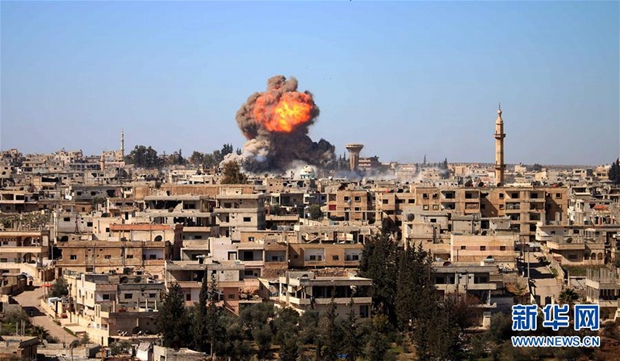Bombing won't save Syria
- By Sumantra Maitra
 0 Comment(s)
0 Comment(s) Print
Print E-mail China.org.cn, April 17, 2018
E-mail China.org.cn, April 17, 2018

Syria [Photo/Xinhua]
Perhaps the most repulsive, pervasive myth of the Syrian civil war is the idea that the West "did nothing" and let the slaughter continue. In reality, however, there has been an intervention going on since 2011. The West tried intervention and nation building in Iraq and failed, then tried intervention and non-nation building in Libya, and that ended in disaster. Syria was different. Assad had Russia and Iran to fall back on – allies, which Saddam and Gaddafi lacked. And the Obama administration didn't calculate that Russia would intervene in favor of Assad to save their naval base in the Mediterranean. It was a strategic miscalculation, as this is the first time the interventionists faced a resistance from another great power.
As Britain, France and the United States bomb Syria for an alleged chemical weapons attack, this history is worth repeating. In the most boneheaded policy ever promoted by any Western government, it was Obama's call for Assad to step down that started this crisis. The rebels were supplied with Qatari- and Saudi-funded weaponry, and given diplomatic support by Israel, Turkey and the West. Assad was bolstered by Iran and Russia, both wary of losing their influence in the vast stretch of land extending to the Mediterranean basin. The result has been untold suffering, and it continues. Anyone now shedding tears about the humanitarian crisis needs to remember that none of this would have happened if the Syrian rebels were not armed by the forces which are opposed to Iran and Assad. There would be no revolution, much less a civil war.
This has been a pattern: to instigate trouble in places and then intervene. Except, in Syria and Ukraine, Russia had naval bases, and decided to put its foot down rather than risk losing it.
The strikes are, needless to mention, on shady legal ground. There were no U.N. votes. There was no U.N. mandate. The Organization for the Prohibition of Chemical Weapons didn't have time to do their investigation before the strikes were called in. The legality of the strikes is dubious and lacks any measurable legitimacy, rendering the constant claim that rule of law is important in international relations hollow. International law remains at the mercy of great power whims.
More interesting was the painstaking work from the Brits, French and Americans to notify Russia. No strikes were done near any Russian base, whether in Tartus, Latakia or Khmeimim. The French notified the Russians beforehand for deconfliction, and it is quite possible that that info was conveyed to Assad. It is simply a way to let Assad know that the West is helpless and has to strike, but as long as chemical weapons are not used, Assad can continue to win the war – which he is winning anyway.
The West has no appetite for a long-term intervention in the Middle East. Assad and Russia know that as well, which is why it is baffling that Assad used these chemical weapons. It defies logic. If I were a military commander advising Assad, why would I tell him to do the one single thing that would bring about Western military intervention? That's not a question I alone ask, but a question taken up by sensible thinkers in the West, including former naval commanders like Admiral Lord West of the United Kingdom.
Ultimately, this bombing didn't serve its intended purpose, and only showed how constrained the options are. It is a signal to Assad and the Russians that no one in the West is interested in Syria, and it is merely optics for domestic purposes. It also showed that international laws are meant only to be broken. Finally, it showed that deterrence doesn't really work, and will perhaps not stop the use of chemical weapons in the future either. It was just a waste of cash, a gigantic virtue signaling, full of sound and fury, signifying nothing.
Sumantra Maitra is a columnist with China.org.cn. For more information please visit:
http://www.china.org.cn/opinion/SumantraMaitra.htm
Opinion articles reflect the views of their authors only, not necessarily those of China.org.cn.






Go to Forum >>0 Comment(s)